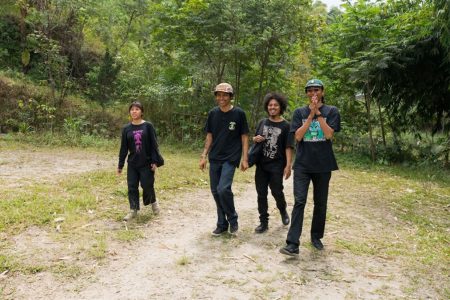Yennu Ariendra is a composer, musician, producer, DJ and artist work on music, performing arts and visual. Most of his works depart on the history and culute of Indonesia, particularly Java. therefore, Yennu uses a lot traditional art practice such as music, dance, visual and ritual to frame them into a new critical narrative and to transform into a contemporary form.
He is part of Teater Garasi / Garasi Performance Institute, rock band Melancholic Bitch, Trauma Rhythm Record; music label, WYST; sound laboratory and Papermoon Puppet Theater. His last projects are No-Brain Dance (2019), Image of the Giant (2019) visual exhibition, and Raja Kirik (2018) album.
The project Yennu works on for Biennale is closely related to his previous projects. The starting point is his observation of diverse forms of symbolic resistance conducted by the grass roots in Java. He begins with a story about Raja Kirik (Dog King) which adopts the traditional dance of Jaranan Buto from Banyuwangi, East Java. The repertoire continues with the musical expression of the grass roots in dangdut koplo genre, and the last, Gruduk Merapi, an expression of art initiated by the local people of Ndeles, Klaten, Central Java.
Throughout the three fragments, Yennu invites us to look at different forms of contention embodied in expressions of art. In the story of Raja Kirik, we can see how the people of Osing (a familiar epithet for the people of Banyuwangi) build a counter-narrative against the story of Menak Jingga.
While the second fragment presents dangdut koplo, a genre of music emerging to break through the monotonous classical dangdut. The third fragment, Gruduk Merapi, serves as the medium through which the people of Ndeles respond to the sand mining business operating in their hometown.





